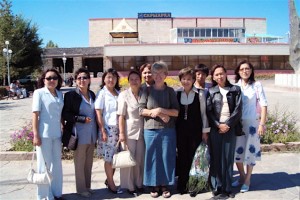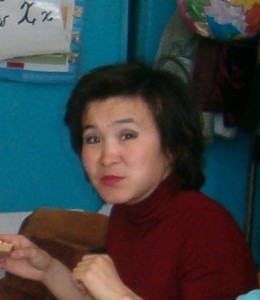September 1 is a special day in Kazakhstan. Throughout the country it is the first day of school and is known as Knowledge Day, an opportunity to celebrate the start of a new school year.
But I’ll remember my first Knowledge Day for another reason. In a year in which many surreal moments filled my days, this one quickly became the most surreal of all. I knew, even as it was happening around me, that someday I would write about the moment. I assumed it would be in the book, but alas, it has been cut in the interest of maintaining my “narrative arc.” Still, I think it works here and I’m happy to share it, finally.
*****
Gulzhahan had been talking about “going out for shashlik” since our counterpart conference at the end of training. “Shashlik in Zhezkazgan is the best in Kazakhstan,” she’d told me when the Peace Corps held a shashlik barbeque. “We will go for shashlik when you come,” she had said, more than a few times. It appeared to be an activity for special occasions. And Knowledge Day was, indeed, a special occasion.
I liked shashlik. It was, I thought, shish kabob without the vegetables: marinated cubes of meat grilled over an open fire. The restaurants served it with raw onion, fresh bread, and vinegar. Each meat-filled skewer cost only 150 tenge. At 135 tenge to the US Dollar, it was a deal. I’d not be eating any that day, though. My lower GI troubles — what I’d dubbed Genghis Khan’s revenge — was still in full swing and I’d put myself on a modified clear liquid diet.
The ten English teachers who had shown up for the college’s Knowledge Day festivities gathered in the courtyard, ready to “go for shashlik.” As we walked along the sidewalk between our college and our shashlik, seven-year-old girls in white dresses with giant bows in their hair and seven-year-old boys in “Sunday suits” filled the sidewalk either coming home from school (the morning group) or heading to school (the afternoon group). Many walked with their mothers, some with both parents, and others walked in small groups of children. None walked alone. A memory from long ago flitted through my head: young boys and girls walking to their first communion at the local Catholic Church. How I envied those girls; I secretly wished my family was Catholic so I could get “a pretty stick-out” dress too. I smiled at the memory.

As we walked the long blocks of Gagarina toward Nekrasova, passing cars threw up clouds of dust, leaving a fine coating over us as we meandered down the sidewalk. But I seemed to be the only one to notice. The café Sony (which they pronounced sa NOO) was an open-walled area, sunken a few steps below the sidewalk level, with picnic tables under a sun-shielding roof. We chose a table and waited while the young waitress set it up with salt, flatware, the traditional single menu, a small pile of white paper napkins, and a small soda bottle filled with vinegar.
“My diploma is in German,” the young teacher to my left told me soon after we sat down, using me to practice her English. I didn’t mind. She knew enough English to tell me that she’d never studied English formally and I was impressed. I was even more impressed with her eyeliner. In a group where few wore makeup, Aizhan had used eyeliner pencil to draw thick lines above, beneath, and beyond her lashes. The elaborate raccoon effect captivated me and I found her fascinating.
“Un botelka vadoo, ee pan. Pazhalsta,” I said to the waitress when it was my turn, proud that I could order a bottle of water and some bread in Russian. Using my Russian language workbook from training, I’d figured out the words earlier that morning. I’d even practiced.
And, when Aizhan asked, “Why are you not eating?” I could answer her in Russian because I’d also carefully memorized the Russian word for what ailed me.
“Oo meenya pa nos,” (I have diarrhea) I told her quietly. We were in a restaurant, after all. My announcement brought a nod of understanding. And a question I hadn’t expected.
“What is the English word for pa nos?”
Before I had a chance to answer, Gulzhahan, sitting across from me, introduced the teacher sitting on her left. Tolganay smiled a shy, slight smile. Then returned to her colleagues to her left.
Aizhan asked again. “What is the English word for pa nos?”
“Gulzhan is the best cook,” Gulzhahan interjected, referring to the woman on her right, seated across from Aizhan. Gulzhan smiled at the compliment, looking demure.
I turned to my left before Aizhan had a chance to ask again. “Diarrhea,” I said quickly.
I liked Aizhan. I liked that she talked to me. While the other teachers gave me friendly smiles, they mostly seemed shy. I found Aizhan’s boldness, in contrast, refreshing.
She repeated the word after me, and I worked a bit on her pronunciation as she took her plate from the waitress. “Di-ar-rhe-a.” She said softly.
“What is it?” I heard someone else ask. “What is pa nos?”
“Di-ar-rhe-a” Aizhan called out, slowly, clearly, proudly, and … loudly. From farther down the table, another called out, “What is it? What is pa nos?”
“Di-ar-rhe-a,” someone else filled in. And as I sat there sipping my water and savoring the fresh baked bread, I could hear up and down the table, each one taking care to put the emphasis on the right syllable, “di-ar-rhe-a” — ten English teachers practicing their new English word for the day.
I sat quietly, content in knowing that the moment would eventually pass, like the bad herring that had started it all.

******
Sometimes sharing our “most embarrassing moment” brings laughter. While this may not serve as a “most embarrassing,” still, it’s up there. How about you? What memories are you finally willing to share?


Marian Beaman
One good thing about deleted scenes is that they can become useful after all. I always learn something from your Peace Corps experiences. This one had extra spice to it. I guess I can thank you for giving me a “Knowledge Day.”
I’ll have to think about an embarrassing moment and post later, Janet.
Janet
I look forward to that, Marian. Somehow, in the retelling, we can better get in touch with the humor. Thanks, always, for being here.
Kathleen Pooler
Janet, these deleted scenes are treasures and I’m so happy you have found a way to share them. “Killing our darlings” can be painful. My editor slashed five chapters that I loved but, alas, narrative arc and commitment to story line trump all. The lesson from your post…never discard your work as it can be used –effectively–in other ways somewhere down the line. I am enjoying learning about this culture and your Peace Corps moments.Thanks for sharing.
Kathy
http://krpooler.com
Janet
Hi Kathy, I love the “kiilling our darlings” phrase. It is so apt, isn’t it. With this new phase of edits (I call them the final final edits) I’m afraid I’ll be posting Deleted Scenes for some time. Will try to limit them to twice a month, however. My condolensces on your five chapters. Ouch. I hope you’ll try my elixir and post them on your blog. Looking forward to your own visit here in February.
gulzhan
Hello Janet!!!Such unforgetable day! I remember that day.Yes you are right I used to be shy. I was afraid to talk to you.I understood English but I couldn’t ask questions that time. It has been 10 years since that day. Thanks PC and PCVs I improved my English!
Janet
Gulzhan, hello. I’m glad you left a comment. And I would add, not only is your English better; your great sense of humor now really shines through (idiom alert!). My mother still talks of your visit and how much she enjoyed meeting you. So glad you dropped in. Thank you.
Assem
i was at maternity leave. I came back in the middle of october and glad to see you!!! The second,wonderful PCV!!!
Janet
Hi Assem. The middle of October, was it? I remember well the day you came back and how friendly you were. That’s one of the best parts of writing a memoir: I get to live those moments twice. Thanks for coming by.
Raw Herring and Other Peace Corps Dangers |
[…] rest of the story can be found in this Deleted Scene from last year, when I went out for lunch with my new colleagues and taught them the English word for pa nos […]